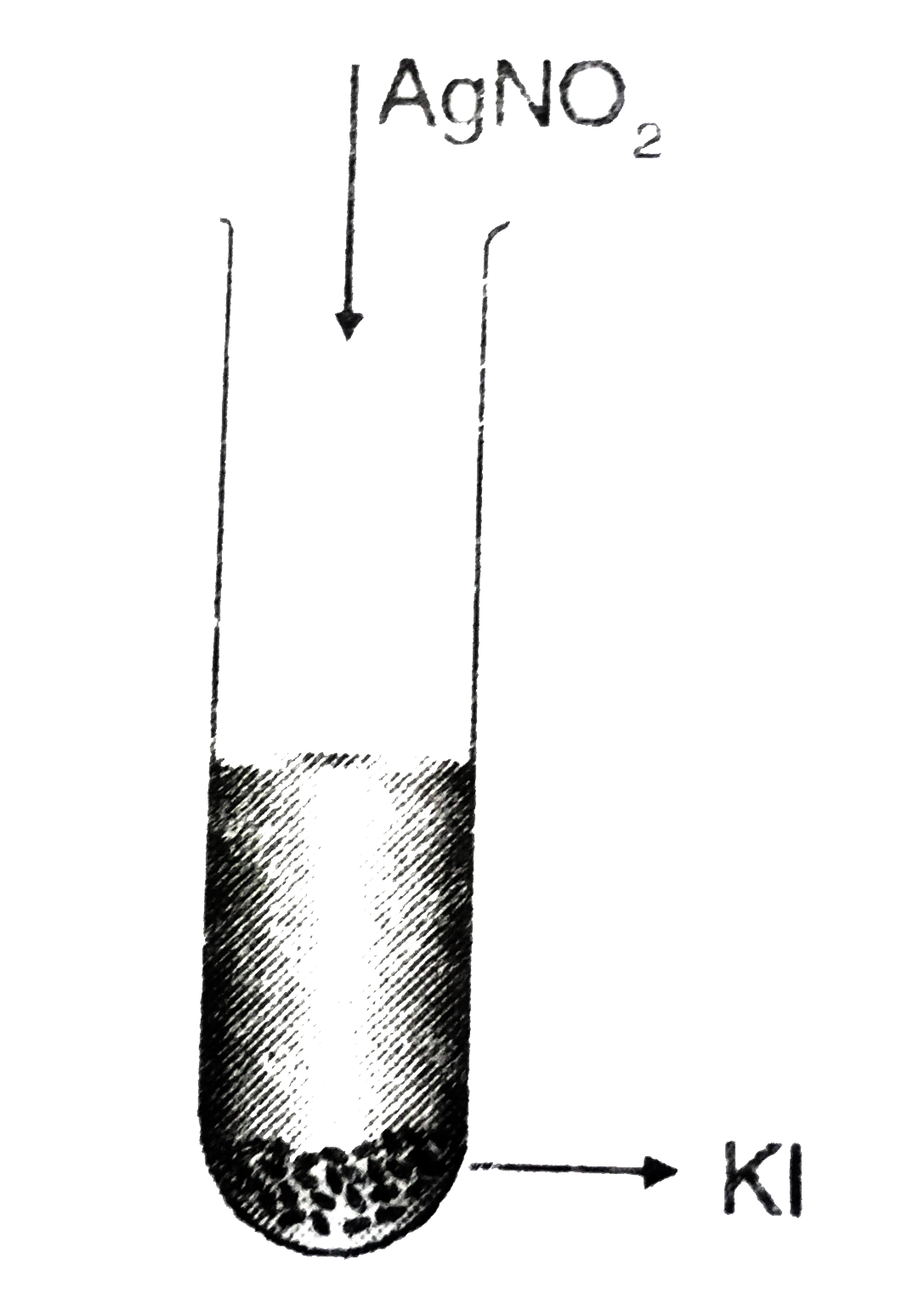Which of the following will be the least effective in the coagulation of Fe(OH)3 salt ?
Mg3(PO4)2
K2CrO4
NaCl
k4[Fe(CN)6]
To determine which of the given options will be the least effective in the coagulation of Fe(OH)3 salt, we need to analyze the charges of the anions present in each option.
1. Identify the Charge of Fe(OH)3:
- Fe(OH)3 is a positively charged colloidal solution. For coagulation to occur, it requires negatively charged ions (anions).
2. Understand Coagulation:
- The coagulation power of an anion is directly proportional to its charge. This means that the higher the negative charge on the anion, the more effective it will be in coagulating the positively charged Fe(OH)3.
3. List the Anions and Their Charges:
- Mg3(PO4)2: The anion is PO43−, which has a charge of -3.
- K2CrO4: The anion is CrO42−, which has a charge of -2.
- NaCl: The anion is Cl−, which has a charge of -1.
- K4(Fe(CN)6): The anion is (Fe(CN)6)4−, which has a charge of -4.
4. Compare the Charges:
- PO43− has a charge of -3.
- CrO42− has a charge of -2.
- Cl− has a charge of -1.
- (Fe(CN)6)4− has a charge of -4.
5. Determine the Least Effective Anion:
- The anion with the least charge is Cl− from NaCl, which has a charge of -1. Therefore, it will be the least effective in coagulating Fe(OH)3.
6. Final Answer:
- The least effective in the coagulation of Fe(OH)3 salt is NaCl.
- Fe(OH)3 is a positively charged colloidal solution. For coagulation to occur, it requires negatively charged ions (anions).
- The coagulation power of an anion is directly proportional to its charge. This means that the higher the negative charge on the anion, the more effective it will be in coagulating the positively charged Fe(OH)3.
- Mg3(PO4)2: The anion is PO43−, which has a charge of -3.
- K2CrO4: The anion is CrO42−, which has a charge of -2.
- NaCl: The anion is Cl−, which has a charge of -1.
- K4(Fe(CN)6): The anion is (Fe(CN)6)4−, which has a charge of -4.
- PO43− has a charge of -3.
- CrO42− has a charge of -2.
- Cl− has a charge of -1.
- (Fe(CN)6)4− has a charge of -4.
- The anion with the least charge is Cl− from NaCl, which has a charge of -1. Therefore, it will be the least effective in coagulating Fe(OH)3.
- The least effective in the coagulation of Fe(OH)3 salt is NaCl.
Topper's Solved these Questions
- SURFACE CHEMISTRYBOOK - VMC MODULES ENGLISHCHAPTER - SURFACE CHEMISTRYEXERCISE - LEVEL-2
65 Videos
- SURFACE CHEMISTRYBOOK - VMC MODULES ENGLISHCHAPTER - SURFACE CHEMISTRYEXERCISE - JEE Main (Archive)
14 Videos
- SURFACE CHEMISTRYBOOK - VMC MODULES ENGLISHCHAPTER - SURFACE CHEMISTRYEXERCISE - PRACTICE EXERCISE
9 Videos
- STRUCTURE OF ATOMBOOK - VMC MODULES ENGLISHCHAPTER - STRUCTURE OF ATOMEXERCISE - IN-CHAPTER EXERCISE-F
7 Videos
- THE SOLID STATEBOOK - VMC MODULES ENGLISHCHAPTER - THE SOLID STATEEXERCISE - EXERCISE-J
10 Videos
Similar Questions
Which of the following is least effective in photosynthesis
View SolutionWhich of the following ions will be most effective in coagulating the As2S3 sol?
View Solution(a) A colloidal sol is prepared by the given method in figure. What is the charge of AgI colloidal particles in the test tube ? How is the sol formed, represented?
 (b) Explain how the phenomenon of adsorption finds application in Heterogeneous catalysis.
(b) Explain how the phenomenon of adsorption finds application in Heterogeneous catalysis.
(c) Which of the following electroytes is the most effective for the coagulation of Fe(OH)3 sol which is a positively charged sol?
NaCI,Na2SO4,Na3PO4
View SolutionWhich one of the following electrolytes is most effective for the coagulation of Fe(OH)3sol and why?
NaCl,Na2SO4,Na3PO4
View Solutionwhich of the following electrolyte will be most effective in coagulation of negative sol ?
View SolutionWhich of the following electrolytes will not be most effective in the coagulation of fold sol?
View SolutionWhich of the following electrolytes is most effective in the coagulation of gold solution?
View SolutionWhich of the following ions is most effective in the coagulation of ferric hydroxide solution?
View SolutionWhich one of the following proteins involved in the coagulation of blood?
View SolutionAnswer the following questions :
(i) Which of the following electrolytes is most effective for the coagulation of AgI/Ag+ sol ?
a. MgCl2,K2SO4,K4[Fe(CN)6]
(b) What happens when a freshly precipitated Fe(OH)3 is shaken with a little amount of dilute solution of FeCl3.
(c) Out of sulphur sol and proteins, which one forms macromolecular colloids ?
View Solution
